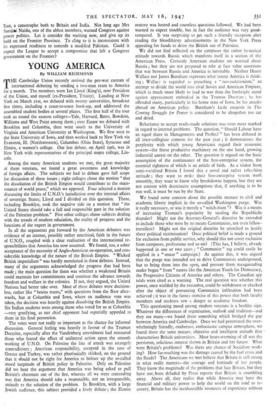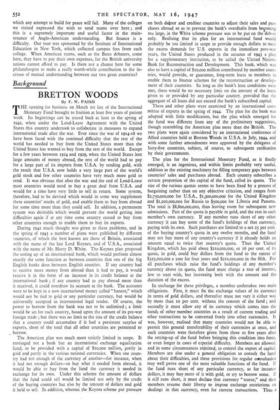YOUNG AMERICA
By WILLIAM RICHMOND
THE Cambridge Union recently revived the pre-war custom of international debating by sending a two-man team to America for a month. The members were Ian Lloyd (King's), now President of the Union, and myself (ex-President, Trinity). Landing at New York on March 21st, we debated with twenty universities, broadcast five times, including a coast-to-coast hook-up, and addressed the assembled student bodies at several places. The first half of the tour took us round the eastern colleges—Yale, Harvard, Bates, Bowdoin, Williams and West Point among them ; over Easter we debated with Brooklyn and Columbia, then went south to the University of Virginia and American University at Washington. We flew west to he State University of Iowa, and then worked back to New York via Evanston, Ill. (Northwestern), Columbus (Ohio State), Syracuse and Elmira, a women's college. Our last debate, on April t9th, was in New York with representatives of the principal negro college, Lin- coln.
Among the many American students we met, the great majority of them veterans, we found a great awareness and knowledge of foreign affairs. The subjects we had to debate gave full scope for discussion of these issues ; eight colleges chose the motion " that the dissolution of the British Empire would contribute to the main- tenance of world peace," which we opposed. Four selected a motion discussing the limits of U.N.O.'s jurisdiction over the internal affairs of sovereign States; Lloyd and I divided on this question. Three, including Brooklyn, took the negative side on a motion that " the United States should take a full and responsible part in the solution of the Palestine problem." Five other colleges chose subjects dealing with the trends of modern edudation, the reality of progress and the functions of the expert in government.
In all the arguments put forward by the American debaters was evidence of an intense, possibly rather uncritical, faith in the future of U.N.O., coupled with a clear realisation of the international re- sponsibilities that America has now assumed. We found, too, a sober acceptance of the necessity of Anglo-American co-operation, and con- siderable knowledge. of the nature of the British Empire. " Wicked British imperialism " was hardly mentioned in these debates. Instead, many of the arguments acknowledged the progress that had been made ; the main question for them was whether a weakened Britain could maintain her commitments and continue the advance towards freedom and welfare in the colonies. If not, they argued, the United Nations had better take over. Most of these debates were decision- less, rather like " brains trusts," with questions from the floor after- wards, but at Columbia and Iowa, where an audience vote was taken, the decision was heavily against dissolving the British Empire. Six Indian students were among those who voted for us at Columbia —very gratifying, as our chief opponent had especially appealed to them in his final peroration.
The votes were not really so important as the chance for informal discussion. General feeling was heavily in favour of the Truman Doctrine, especially after the Vandenberg amendment had reassured those who feared the effect of unilateral action upon the smooth working of U.N.O. On Palestine the line of attack was strangely contradictory ; American responsibility, accepted in the case of Greece and Turkey, was rather pharisaically shirked, on the ground that it vfould not be right for America to bolster up the so-called moral turpitude of British policy in Palestine. Only on Palestine did we hear the argument that America was being asked to pull Britain's chestnuts out of the fire, whereas all we were contending was that America should take a responsible, not an irresponsible, attitude to the solution of the problem. In Brooklyn, with a large Jewish audience, this subject provided a lively debate ; the Zionist oratory was heated and countless questions followed. We had been warned to expect trouble, but in fact the audience was very good- tempered. It was surprising to get such a friendly reception after reading the bloodthirsty advertisements in the New York Press appealing for funds to drive the Biitish out of Palestine.
We did not find reflected on the campuses the rather hysterical attitude towards Russia which manifests itself in a section of the American Press. Certainly American students are worried about Russia ; but they are not prepared to take at face value assertions that war between Russia and America is inevitable. Neither Henry Wallace nor James Burnham expresses what young America is think- ing ; Wallace is regarded as preaching a " neo-isolationism," an attempt to divide the world into rival Soviet and American Empires, which is much more likely to lead to war than the forthright stand against appeasement embodied in the Truman Doctrine ; he has offended many, particularly in his home state of Iowa, by his attacks abroad on American policy. Burnham's facile exegesis in The Coming Struggle for Power is considered to be altogether too cut and dried.
Reluctance to accept ready-made solutions was even more marked in regard to internal problems. The question, " Should Labour have an equal share in Managements and Profits? " has been debated in all inter-collegiate contests for the past year ; it demonstrates the perplexity with which young Americans regard their economic system—the finest productive machinery on the one hand, growing industrial unrest on the other. The question is argued on the basic assumption of the continuance of the free-enterprise system, the essential rightness of which is an article of faith. As a visitor from semi-socialised Britain I found this a novel and rather refreshing attitude ; they want to make their free-enterprise system work smoothly, they want to know why breakdowns happen, but they are not content with doctrinaire assumptions that, if anything is to be run well, it must be run by the State.
We found some concern about the possible menace to civil and academic liberty implicit in the so-called Washington purge. Was it really necessary, or was it merely a " witch-hunt "? Was it a means of increasing Truman's popularity by stealing the Republicin thunder? Might not the Attorney-General's directive be extended to include those who were by no means Communists, not even fellow- travellers? Might not the original doctrine be stretched to justify sheer political victimisation? Once political belief is made a ground for exclusion from public service, why should this not cover exclusion from campuses, professions and so on? (This has, I believe, already happened in one or two cases ; " Communist " tag could easily be applied in a " smear " campaign.) As against this, it was argued that the purge was intended not to drive Communists underground, but to bring them into the open, and prevent them masquerading under bogus " front " names like the American Youth for Democracy, the Progressive Citizens of America and others. The Canadian spy trials were cited as a warning. The real question was whether this power, once wielded by the executive, could be withdrawn or checked after the object of preventing Communist infiltration had been achieved ; it was in the future exercise of this power that both faculty members and students saw a danger to academic freedom.
This questioning mood among student veterans is a healthy sign. Whatever the differences of organisation, outlook and tradition—and they are many—we found there something which bridged the gap between America and Cambridge. Once we had penetrated the over- whelmingly friendly, exuberant, enthusiastic campus atmosphere, we found there the same mature, objective and intelligent attitude that characterises British universities. Most heart-warming of all was the persistent, solicitous interest shown in Britain and her future. What were Britain's problems? Was there any chance of Socialism work- ing? How far-reaching was the damage caused by the fuel crisis and the floods? The Americans we met believe that Britain is still strong in what really matters—the courage and fortitude of her people. They know the magnitude of the problems that face Britain, but they have not .been deluded by Press reports that Britain is crumbling away. Above all, they realise that while America may have the financial and military power to help the world on the road to re- covery, Britain has the inexhaustible resources of experience without which any attempt to build for peace will fail. Many of the colleges we visited expressed the wish to send teams over here ; and this is a supremely important and useful factor in the main- tenance of Anglo-American understanding. But finance is a difficulty. Our tour was sponsored by the Institute of International Education in New York, which collected campus fees from each college. When American teams, such as the Bates debaters, come here, they have to pay their own expenses, for the British university unions cannot afford to pay. Is there not a chance here for some philanthropist to make a really worth-while contribution to the in- crease of mutual understanding between our two great countries?



































 Previous page
Previous page